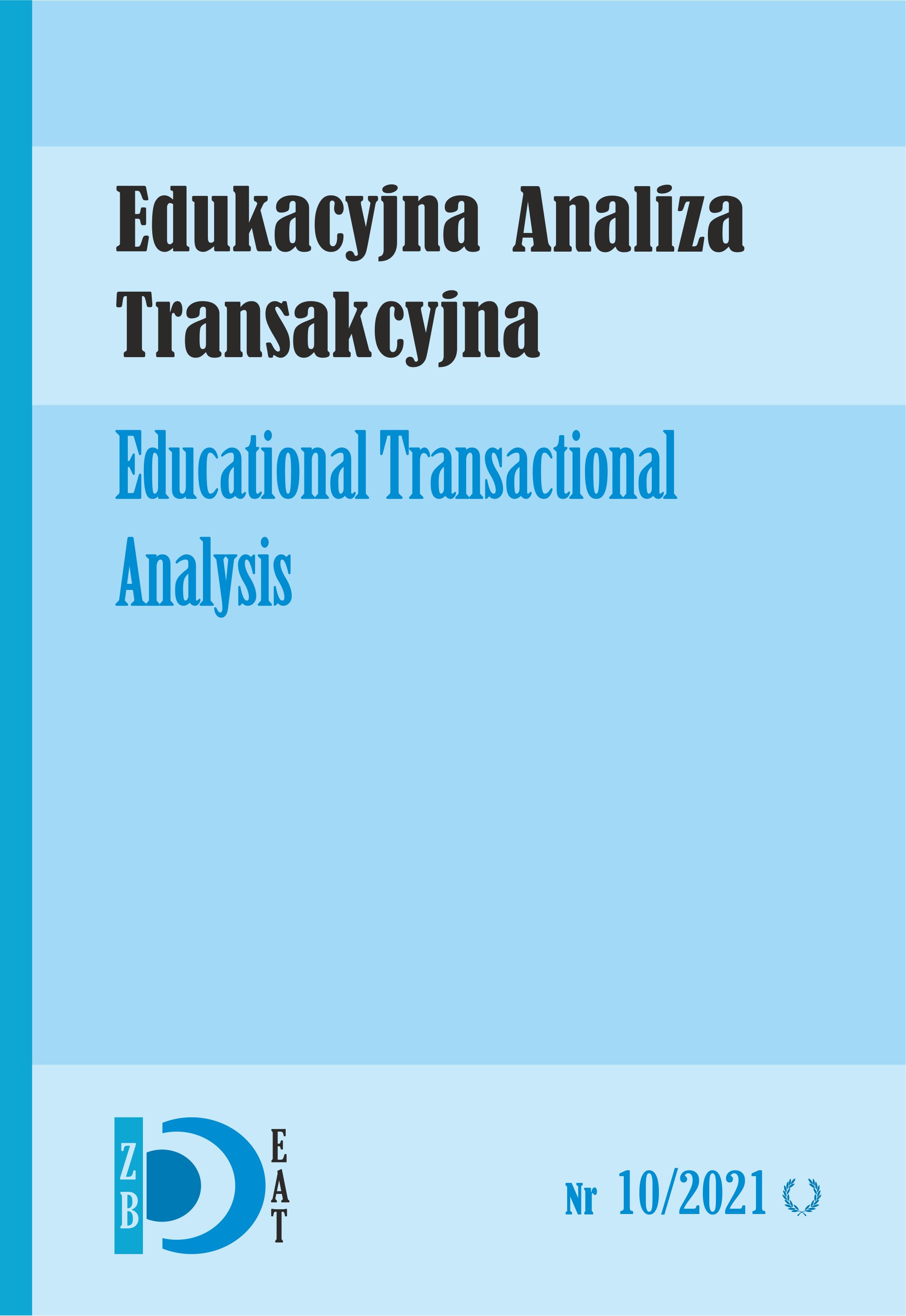Didactic dimension of electroencephalographic research in terms of educational transactional analysis.
DOI:
https://doi.org/10.16926/eat.2021.10.03Keywords:
educational theory, didactics, constructivism, electroencephalographic research, EATAbstract
The paper presents selected results of the author's research conducted at the Laboratory of Experimental Research Biofeedback of Jan Długosz University in Częstochowa on the didactic activity of students in technical education. The presented research results are a partial answer to the questions posed in the theory of information technology education. The implementation of online education in the time of the COVID-19 pandemic with the use of deterministic computer simulations is a proposal to start a discussion on the importance of modern information transfer techniques as a key element of student-teacher communication.
Downloads
References
Addis, D. R., Barense, M., & Duarte, A. (2015). The Wiley Handbook on the Cognitive Neuroscience of Memory.
Bowers, J. S. (2016). The practical and principled problems with educational neuroscience. Psychological Review, 123(5), p.600–612.
Chojak M., (2019). Neuropedagogika, neuroedukacja i neurodydaktyka. Fakty i mity, Wyd. Difin.
Crawford, F. (2012). Uczestnictwo w transformacji systemu edukacji. W: Jakość edukacji. Różnorodne perspektywy, G. Mazurkiewicz (red.), Kraków: Wydawnictwo UJ.
Dryden G. Vos J., (2003). Rewolucja w uczeniu, Wydawnictwo Zysk i S-ka, Poznań.
Łęski, Z. (2017). Nowe media w społeczeństwie informacyjnym z perspektywy analizy transakcyjnej. Praca czy współpraca?, Edukacyjna Analiza Transakcyjna, 6.
Mietzel G., (2003). Wprowadzenie do psychologii, GWP, Gdańsk.
Osiński, Z., (2010). Metody, formy i programy kształcenia. W poszukiwaniu efektywnych metod kształcenia uniwersyteckiego, E-mentor, nr 2 (34).
Pankowska, D. (2012). Analiza transakcyjna w edukacji czy edukacyjna analiza transakcyjna? – próba porządkowania znaczeń. Edukacyjna Analiza Transakcyjna, 1.
Pawłowski, K., (2004). Społeczeństwo wiedzy – szansa dla Polski, Wydawnictwo Znak, Kraków.
Prauzner, T. (2013). Information Technology in Contemporary Education – Individuals’ Researche. American Journal of Educational Research, 2013, Vol. 1, No. 10, p.430-435.
Prauzner, T. (2015). Analysis of the results of the pedagogical research and EEG in the aspect of effective modern teaching aids in the technical education. Society. Integration. Education, Proceedings of the International Scientific Conference. Volume IV, May 22th-23th 2015, Rēzekne: Rēzeknes Augstskola, Latvia, p.480-489.
Prauzner, T. (2017). The effectiveness of school education - featured implications considerations. Society. Integration. Education, Proceedings of the International Scientific Conference. Volume III, May 26th-27th 2017, Rēzekne: Rēzeknes Augstskola, Latvia, p.558-564.
Prauzner, T. (2018). Cognitive mechanisms in the didactics of technical vocational subjects in the light of research on bioelectrical brain activity. Society. Integration. Education Proceedings of the International Scientific Conference. Volume I, May 25th-26th, Rēzekne: Rēzeknes Augstskola, Latvia, p.454-463.
Prauzner, T., (2020). Innovativeness of didactic practice in the field of current pedagogical knowledge, Society. Integration. Education., Proceedings of the International Scientific Conference., Volume II, May 22th -23th, Rēzekne: Rēzeknes Augstskola, Latvia, p.247-255.
Prauzner, T., Prauzner M., Prauzner K., Ptak P. (2019). Cognitive activity in the respect of qeeg research - presentation of laboratory tests. Society. Integration. Education., Proceedings of the International Scientific Conference., Volume V, May 24th-25th, Rēzekne: Rēzeknes Augstskola, Latvia, p.469-478.
Prauzner, T., Prauzner, K., Ptak, P., Noga, H., Migo, P., Depešová, J., (2020). Wpływ warunków otoczenia na dokładność badań elektroencefalograficznych QEEG (The influence of environmental conditions on the accuracy of QEEG electroencephalography). Przegląd Elektrotechniczny, R. 96 NR 4/2020, p.86-89.
Prauzner, T., Prauzner, M., Prauzner, K. (2019). Aktywność pracy mózgu w procesie dydaktycznym w ujęciu badań elektroencefalograficznych, Kwartalnik Naukowy, Edukacja – Technika – Informatyka, p.321-317.
Sikorski W., (red.), (2015). Neuroedukacja, Jak wykorzystać potencjał mózgu w procesie uczenia się, Wyd. Dobra Literatura, Słupsk.
Thompson, M., T. L. (2012). Neurofeedback, wprowadzenie do podstawowych koncepcji psychofizjologii stosowanej (The Neurofeedback Book. An Introduction to Basic Concepts in Applied Psychophysiology). Wrocław: Biomed Neurotechnologie Sp. z o.o. Sp. k.
Wietrzykowski, W. (2010). Biologiczna Sieć Pakietowa. Pobrane z: http://net3plus.awardspace.com (4.03.2018).
Zarzecki, L., (2008). Wybrane problemy dydaktyki ogólnej, Wydawnictwo Kolegium Karkonoskie w Jeleniej Górze, Jelenia Góra.
Downloads
Published
Versions
- 2021-12-30 (2)
- 2021-12-30 (1)
How to Cite
Issue
Section
License
Copyright (c) 2022 Tomasz Prauzner, Kacper Prauzner

This work is licensed under a Creative Commons Attribution 4.0 International License.
I am aware that the Educational Transactional Analysis journal is published under a Creative Commons license - Attribution (https://creativecommons.org/licenses/by/4.0/legalcode).
By submitting the article, I agree to make it available under this license

